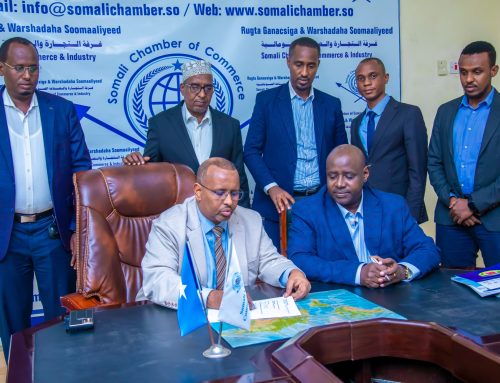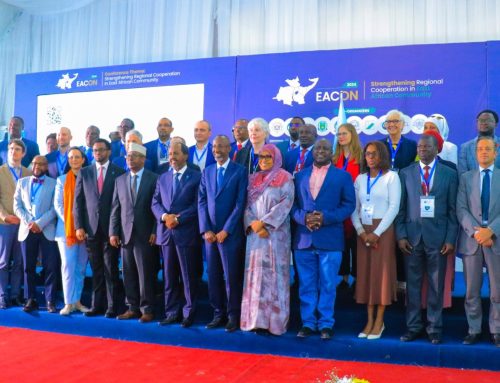- Introduction:
In light of the impact of COVID-19 pandemic on global & regional value chains and business operations in the East African Community, the East African Business Council organized a webcast on the impact of COVID-19 on EAC trade and investment and economic recovery strategy for the region on 8th May 2020 at 14:00hrs-16:00hrs via Microsoft Teams. The webcast brought together over 160 participants composed of Senior Government Officials from the Ministry of Trade and Industry, Business leaders, Industry Captains, Development Partners and the East African business community who participated and jointly charted out appropriate recommendations towards a regional coordinated approach on COVID-19 for increased intra-EAC trade and investments.
- Welcome remarks
The Moderator of the webinar Dr. Peter Mathuki, the Chief Executive Officer of the East African Business Council noted that, following the outbreak of COVID-19 in December 2019, there has been a significant disruption in the global value chains with China being the hub of manufacturing for most business operations. The spillover effect of this disruption has been felt by other African economies and largely by East African businesses being largely importers of goods and services in the global economy.
It was also observed that trade has emerged as a remedy that could reduce this adversity through the flow of essential goods like food, medical supplies and other hygiene products. However, despite the efforts to sustain trade in the region in the face of the global pandemic, various challenges continue to present themselves across the region, affecting the Financial Sector, Manufacturing, Tourism, Informal Trade, Agriculture, Cargo Transport, etc.
3.0 Panel Discussions:
The panel discussion was composed of representatives from the Minister of Trade and Industry, EAC Secretariat, the private sector and Development Partners namely: Mr. Nick Nesbitt-Chairman, East African Business Council (EABC), Mr. Simon Kaheru, Uganda Manufacturers Association (UMA), Mr. Kenneth Bagamuhunda-Director General, Customs and Trade, East African Community Secretariat, Mr. Frank Matsaert, Chief Executive Officer, TradeMark East Africa, Dr. Kirsten Focken-EAC-GIZ Cluster Coordinator, GIZ-EAC Secretariat, Mr. Robert Opirah, Director of Trade, Ministry of Trade and Industry, Rwanda (Representing Hon. Soraya Hakuziyaremye, Minister of Trade and Industry, Rwanda), and Mr. Godfrey Walakila from the Ministry of Trade and Industry, Uganda (Representing Hon. Amelia Kyambadde, Minister of Trade and Industry).
2.1 Panel Highlights:
- Mr. Robert Opirah, Director of Trade, Ministry of Trade and Industry, Rwanda:
The panelist expounded on the impact of COVID-19 on EAC economies and Government interventions to ensure business continuity and increase intra-EAC trade during and post COVID-19 pandemic. The following are the key highlights:
- Various measures adopted by EAC Partner States either partial or total lockdown have had varying impact on EAC GDPs e.g. Rwanda GDP growth for 2020 is expected to decline to 3.5% from the 8.0% which was projected before the outbreak of COVID-19 while the Global GDP has declined by 5%.
- EAC Country’s measures were first geared towards containing the spread of COVID-19, but lockdowns have slowed down the economic activities, and in Rwanda, 50% of total jobs have been affected.
- The health measures instituted, were complemented with measures that ensure consistent provision of essential services and flow of the goods such as food distribution health equipment.
- Need to support businesses in maintaining cash flow to continue the supply of essential services.
- Appreciated that businesses in the region have demonstrated efforts in responding to emerging challenges amidst COVID-19 and have taken up opportunities that have been presented by the pandemic.
- EAC Partner States need to continue offering various measures (Fiscal & Monetary) to businesses to mitigate the impact of the COVID-19 as well as scaling up their activities.
- Advised EAC Partner States to consider the progressive lifting of lockdowns while ensuring the safety of citizens.
- Mr. Kenneth Bagamuhunda-Director General, Customs and Trade, East African Community Secretariat:
The Director-General discussed on the how COVID-19 pandemic has reshaped priorities in driving EAC integration agenda and highlighted the following:
- Need to build resilient EAC economies that are not over-reliant to the foreign market for both imports and exports. There is a need to promote import substitution while promoting key value chains such as agriculture, manufacturing, investment and services to address over-reliance to China and Europe for intermediate and final products.
- The EAC is working on the regional recovery plan for priority sectors such as industry, agriculture, investment and the report to be shared upon finalization.
- On regional coordination approach, EAC has developed a regional response plan on the fight against COVID-19, mobilization of resources to implement activities that are geared towards supporting Partner State to recover from the pandemic, administrative guidelines on the movement of people and goods across the region during the pandemic outbreak as well as the development of digital surveillance tools to help cargo movement.
- Joint response committees that compose officials from the EAC Secretariat and National response teams have been created including one on Trad and Investment, that is specifically aimed at addressing all issues that are affecting business across the region.
- Mr. Frank Matsaert, Chief Executive Officer, TradeMark East Africa:
The following were the key highlights:
- Need to refocus and repurpose the EAC economies to ensure continuity of business
- Need to secure operations of EAC trade corridors to ensure that products move easily and avoid disruptions
- Need for the adoption of technology and strengthen e-commerce to support SMEs
- There is a need to shorten the supply chains and diversify them. This can be enabled through local sourcing of products from within the region rather preference to trade with the far East.
- To ensure safe trade, there is a need to adopt regional regulations and Standard Operating Procedures (SOPs) that address trade-related challenges across the region uniformly,
- Need to monitor Regional Value Chains and build alliances that support SMEs
- Need for adoption Open Skies Policy that addresses export bottlenecks where a National Airline would be allowed to pick cargo from each Partner State to promote exports from the EAC region,
- Need to develop infrastructure that can track truck drivers from the source to destination to avoid interaction with the public in fighting the spread of COVID-19.
- Dr. Kirsten Focken-EAC-GIZ Cluster Coordinator, GIZ-EAC:
The key highlights in the discussion included;
- Need to develop mid and long-term plans for combating pandemics
- Need for coordinated and efficient communication on the to help effective fight against the pandemic across the region,
- Need to ensure that Partner States do not introduce new restrictions and Non-Tariff Barriers in the fight against the spread of COVID-19.
- Digitalization of processes need to be strengthened rather than physical exchanges
- EAC Health systems need to be more solid and strengthened to cope with the magnitude of the spread
- Mr. Nick Nesbitt-Chairman, East African Business Council (EABC):
- East Africa needs to shorten its supply chains by sourcing from the region and ensuring local content policy adoption.
- Increase in our Importing for raw materials and grow EAC supply chains.
- Need to facilitate in the issuance of work permits to experts that are expected to provide technical assistance and develop local capacity to replace reliance on imports from foreign markets.
- Ecommerce platforms are helping people to get accustomed to working from home life.
- There is a need for the region to re-examine its export strategy to fit into the emerging challenges.
- Government as main employers should pay all bills to the private sector, pay VAT refund, etc to inject more cash in the market.
- SMEs need to be supported to enable them to recover from Covid19.
- Mr. Simon Kaheru, Uganda Manufacturers Association (UMA):
- Main challenges for Manufacturers during COVID-19 pandemic: include low consumption, inadequacy supply of raw materials, disruption of supply chain and increased labour cost due to applications of measures to control the spread of COVID-19.
- Opportunities including manufacturing of health equipment/products i.e. Production of Personal Protective Equipment (PPE), sanitizers; Poultry farming etc.
- The COVID-19 pandemic has strengthened Public-Private Dialogue as a private sector to continue supporting Govts in the fighting COVID-19 pandemic.
- Need for growth of manufacturing in the agricultural sector e.g. production of calcium from eggshells etc.
- Manufacturing is being highly prioritized by the EAC partner states.
- Business community has stepped up in helping the public sector and therefore in compliance with protective measures.
- Mr. Godfrey Walakila, Ministry of Trade and Industry, Uganda:
- Need to strike a compromise between health measures and facilitating trade to ensure that both are done without one affecting the other.
- Governments need to find ways to assist cross border small traders amidst the outbreak of the pandemic.
- Traders are working under borrowed funds and suffering due to cash flow issues and paying loans. Governments need to them with substantial tax reliefs.
- Need for stimulus packages to help the private sector, in general, revive businesses across the region.
3.0 Key Recommendations:
- Need for EAC Coordinated Approach in the fight against COVID-19. This calls for the adoption of flexible and adaptable measures as a region, geared towards cushioning the economies from the socio-economic impacts of COVID-19.
- Need to ensure continuity of business by the provision of liquidity to the most affected sectors.
- Monitor EAC priority Value Chains to ensure that they are not adversely affected.
- Ensure Adoption of Open Skies Policy.
- Need for safeguard regulations and Standard Operating Procedures that are regional in nature to protect nascent businesses from shocks.
- Need to ensure regional corridors are operational without hampering trade to ensure goods flow across the region.
- Ensuring that Supply Chains are shortened to reduce dependence on foreign markets for imports and exports.
- Need to ensure there is coordinated communication and awareness of the pandemic control measures across the region.
- Ensure control and removal of identified restrictions and Non-Tariff Barriers (NTB).
- Need for flexibility in issuance of work permits to Experts with various facets of knowledge to help EAC Economies to grow.
- Need to digitize businesses to reduce adverse shocks and develop regulations that protect emerging sectors such as e-commerce and other digital innovations.





